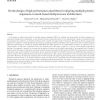65 search results - page 7 / 13 » Deriving epistemic conclusions from agent architecture |
AGENTS
1997
Springer
14 years 2 months ago
1997
Springer
We have been developing Rogue, an architecture that integrates high-level planning with a low-level executing robotic agent. Rogue is designed as the oce gofer task planner for X...
EUMAS
2006
13 years 11 months ago
2006
One of the major puzzles in performing multi-agent-based simulations is the validity of their results. Optimisation of simulation parameters can lead to results that can be deceit...
PDPTA
1996
13 years 11 months ago
1996
The problem of eciently retrieving and ranking documents from a huge collection according to their relevance to a research topic is addressed. A broad class of queries is de
ned a...
ATAL
2009
Springer
14 years 4 months ago
2009
Springer
The Modular Architecture for Bootstrapped Learning Experiments (MABLE) is a system that is being developed to allow humans to teach computers in the most natural manner possible: ...
JPDC
2007
13 years 9 months ago
2007
In this paper, we address the problem of multiple sequence alignment (MSA) for handling very large number of proteins sequences on mesh-based multiprocessor architectures. As the ...

